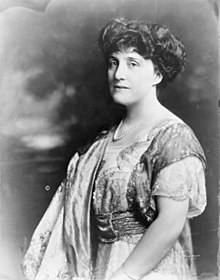Mary Roberts Rinehart
| Mary Roberts Rinehart | |
|---|---|

Mary Roberts Rinehart (1914)
|
|
| Born | Mary Ella Roberts August 12, 1876 Allegheny City, Pennsylvania |
| Died | September 22, 1958 (aged 82) New York, New York, US |
| Occupation | Writer |
| Nationality | American |
| Genre | Mystery fiction |
Mary Roberts Rinehart (August 12, 1876 – September 22, 1958) was an American writer, often called the American Agatha Christie, although her first mystery novel was published 14 years before Christie's first novel in 1922.
Rinehart is considered the source of the phrase "The butler did it" from her novel The Door (1930), although the novel does not use the exact phrase. Rinehart is also considered to have invented the "Had-I-But-Known" school of mystery writing, with the publication of The Circular Staircase (1908).
She also created a costumed super-criminal called "the Bat", cited by Bob Kane as one of the inspirations for his "Batman".
Mary Roberts Rinehart was born Mary Ella Roberts in Allegheny City, Pennsylvania, now a part of Pittsburgh. Her father was a frustrated inventor, and throughout her childhood, the family often had financial problems. Left-handed at a time when that was considered inappropriate, she was trained to use her right hand instead.
She attended public schools and graduated at age 16, then enrolled at the Pittsburgh Training School for Nurses at Pittsburgh Homeopathic Hospital, where she graduated in 1896. She described the experience as "all the tragedy of the world under one roof." After graduation, she married Stanley Marshall Rinehart (1867–1932), a physician she had met there. They had three sons: Stanley Jr., Alan, and Frederick.
During the stock market crash of 1903, the couple lost their savings, spurring Rinehart's efforts at writing as a way to earn income. She was 27 that year, and produced 45 short stories. In 1907, she wrote The Circular Staircase, the novel that propelled her to national fame. According to her obituary in the Pittsburgh Post-Gazette in 1958, the book sold 1.25 million copies. Her regular contributions to The Saturday Evening Post were immensely popular and helped the magazine mold American middle-class taste and manners.
...
Wikipedia
